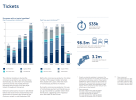Related mayoral answer for those interested in the technicalities
More https://www.theyworkforyou.com/london/?id=2022-02-18.0284.h&p=11878#g0284.r0The 1995 Travelcard Agreement and the Day Travelcard (Peak) Agreement were amended, restated and consolidated as the Amended and Restated Travelcard Agreement 2018. The Agreement contains provisions for withdrawing Travelcards or ceasing participation in the Agreement. No discussions have taken place between Transport for London (TfL) and rail operators.

